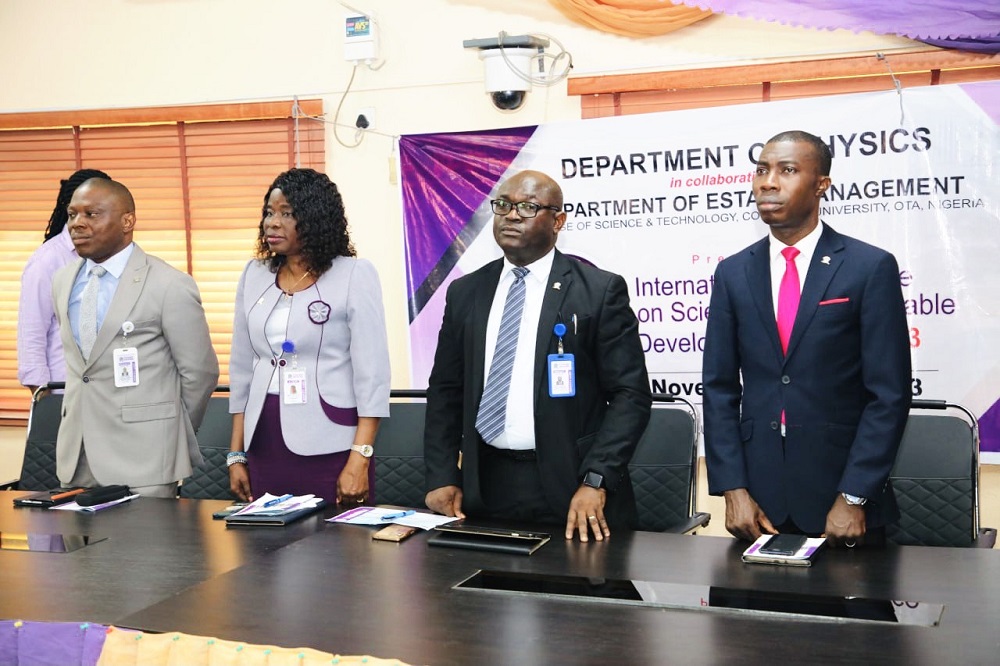Covenant University’s Department of Physics, in collaboration with the Department of Estate Management, has commenced the 7th International Conference on Science and Sustainable Development (ICSSD), 2023, with the theme, ‘Science as a Catalyst for Sustainable Development in Sub-Saharan Africa.’
While making his opening remarks at the event, the Chairman, Local Organising Committee (LOC) of the conference, Dr. Rasidi Sule, stated that available reports have shown that sub-Saharan Africa is less developed compared to Northern Africa, despite good deposits of minerals and other natural resources in the region.
He said that the high level of poverty, poor electrification, poor healthcare, food insecurity, housing shortages, increasing building collapse due to inferior construction materials, poor industrialization, environmental pollution, the effect of climate change, and many other challenges have necessitated the need for the gathering of the academia, established scientists, emerging researchers, industry, and policymakers to ensure sustainable development in sub-Saharan Africa, through an innovative approach.
He appreciated the Board of Regents of the University for being a strong pillar of encouragement and inspiration to the research efforts of the University and also thanked the University Management for the great support the conference has received.
In his remarks, the Head of Department, Physics, Covenant University, Dr. Maxwell Omejeh, stated that the conference is aimed at exploring a theme of paramount importance, which is science as the catalyst for sustainable development in sub-Saharan Africa.
He elucidated that in a world increasingly shaped by technological advancements, innovation, and a shared commitment to sustainability, our collective focus on the role of science in fostering development within the sub-Saharan Africa context is both timely and imperative.
He noted that a collective commitment to explore the transformative power of science as a catalyst for development in sub-Saharan Africa, in the vast history of global challenges, the focus on sub-Saharan Africa, underscores the urgency and importance of leveraging scientific advancement for sustainable progress.
“As we stand at the intersection of innovation and sustainable development, it is clear that science holds the key to unlocking new pathways toward prosperity, resilience, and equitable growth, in this dynamic and diverse region.
“Our collective goal is not only to understand the intricate relationship between science and sustainable development but to actively contribute to a future where scientific advancement becomes the cornerstone of progress for all nations, particularly those in sub-Saharan Africa,” He explained
The Vice-Chancellor, Professor Abiodun Adebayo, ably represented by the Deputy Vice-Chancellor, Professor Olujide Adekeye, commended the theme of the conference, for resonating with the ever-growing impact of science and technology on society. He stated that everyone can literally see the importance of sustainable development in addressing myriad of challenges threatening human existence, such as climate change, hunger, environmental degradation, water scarcity, inequality, diseases, poverty, and so on.
He acknowledged that the Sustainable Development Goals (SDGs), adopted by the United Nations in 2015, have remained pivotal to global climate calls and efforts to address existential threats to humanity and the Earth.
He noted that these goals also align with the African Union's New Partnership for Africa's Development 2063 (NEPA), whose objectives are to reduce poverty, place Africa on a sustainable development pathway, stem the continent's relegation in the Committee of Nations, and empower the world.
He maintained that advancements in science and technology have been recognized globally as indispensable catalysts for achieving these sustainable solutions to environmental, health, social, and economic challenges.
“The increasing use of innovative technologies such as 3D printing, cloud computing, artificial intelligence, the Internet of Things, and robotics has fostered an era of multiplicity disruptions with unprecedented possibilities,” he added
He explained further that they offer prospects for more access to education, information, and competencies, and unlock opportunities for better business, improved food production, employment prospects, increased productivity, and access to efficient healthcare delivery and environmental protection.


